
Coca-Cola, or Coke, is a carbonated soft drink manufactured by the Coca-Cola Company. In 2013, Coke products were sold in over 200 countries worldwide, with consumers drinking more than 1.8 billion company beverage servings each day. Coca-Cola ranked No. 87 in the 2018 Fortune 500 list of the largest United States corporations by total revenue. Based on Interbrand's "best global brand" study of 2020, Coca-Cola was the world's sixth most valuable brand.

Cola is a carbonated soft drink flavored with vanilla, cinnamon, citrus oils, and other flavorings. Cola became popular worldwide after the American pharmacist John Stith Pemberton invented Coca-Cola, a trademarked brand, in 1886, which was imitated by other manufacturers. Most colas originally contained caffeine from the kola nut, leading to the drink's name, though other sources have since been used. The Pemberton cola drink also contained a coca plant extract. His non-alcoholic recipe was inspired by the coca wine of pharmacist Angelo Mariani, created in 1863.

A soft drink is any water-based flavored drink, usually but not necessarily carbonated, and typically including added sweetener. Flavors used can be natural or artificial. The sweetener may be a sugar, high-fructose corn syrup, fruit juice, a sugar substitute, or some combination of these. Soft drinks may also contain caffeine, colorings, preservatives and other ingredients.

Red Bull is a brand of energy drinks created and owned by the Austrian company Red Bull GmbH. With a market share of 43%, it is the most popular energy drink brand as of 2020, and the third most valuable soft drink brand behind Coca-Cola and Pepsi. Sinсe its launch in 1987, more than 100 billion cans of Red Bull have been sold worldwide, including over 11.5 billion in 2022.
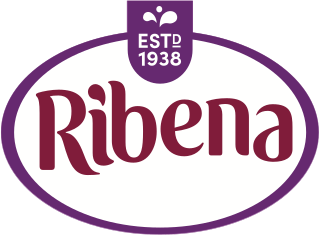
Ribena is a brand of blackcurrant-based soft drink, and fruit drink concentrate designed to be mixed with water. It is available in bottles, cans and multi-packs. Originally of British origin, it was produced by British pharmaceutical company GlaxoSmithKline (GSK) until 2013, when the brand was sold to Japanese beverage conglomerate Suntory.
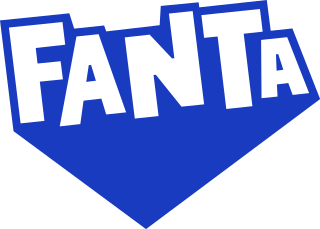
Fanta is an American-owned German brand of fruit-flavored carbonated soft drinks created by Coca-Cola Deutschland under the leadership of German businessman Max Keith. There are more than 200 flavors worldwide. Fanta originated in Germany as a Coca-Cola alternative in 1940 due to the American trade embargo of Nazi Germany, which affected the availability of Coca-Cola ingredients. Fanta soon dominated the German market with three million cases sold in 1943. The current formulation of Fanta, with orange flavour, was developed in Italy in 1955.

Mecca-Cola is a cola-flavoured carbonated beverage. The flagship product of the Mecca Cola World Company, it is marketed as an alternative to U.S. brands such as Coca-Cola and Pepsi-Cola to "pro-Muslim" consumers. The product's name contains the traditional Latin-alphabet transliteration of مكة, "Mecca" in Saudi Arabia.

The Coca-Cola Company is an American multinational corporation founded in 1892, best known as the producer of Coca-Cola. The drink industry company also manufactures, sells, and markets other non-alcoholic beverage concentrates and syrups, and alcoholic beverages. The company's stock is listed on the NYSE and is part of the DJIA and the S&P 500 and S&P 100 indexes.

Coca-Cola Amatil Limited (CCA) was an Australian bottler of non-alcoholic beverages that existed from 1904 to 2021, when it merged with Coca-Cola European Partners to form Coca-Cola Europacific Partners. It was one of the largest bottlers of non-alcoholic ready-to-drink beverages in the Asia-Pacific region and one of the world's five major Coca-Cola bottlers. CCA operated in six countries—Australia, New Zealand, Indonesia, Papua New Guinea, Fiji and Samoa. The company also bottled beer and coffee.

Shasta Beverages is an American soft drink manufacturer that markets a value-priced soft drink line with a wide variety of soda flavors, as well as a few drink mixers, under the brand name Shasta. The company name is derived from Mount Shasta in northern California and the associated Shasta Springs.
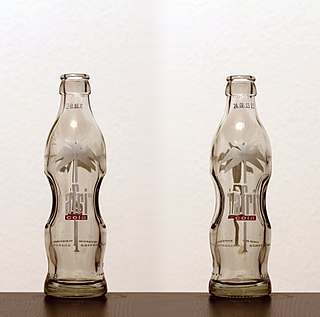
Afri-Cola is a cola soft drink produced in Germany. The trademark Afri-Cola was registered in 1931 by the company F. Blumhoffer Nachfolger GmbH. The same company also produced Bluna, an orange soft drink. Today the brand belongs to the Mineralbrunnen Überkingen-Teinach AG. Afri-Cola was once one of the most popular cola brands in Germany, but has lost considerable market share since the 1960s.

The World of Coca-Cola is a museum located in Atlanta, Georgia, United States, showcasing the history of The Coca-Cola Company. The 20-acre (81,000 m2) complex opened to the public on May 24, 2007, relocating from and replacing the original exhibit, which was founded in 1990 in Underground Atlanta. There are various similar World of Coca-Cola stores in locations such as Las Vegas and Disney Springs.
In beverages, Rola Cola was a carbonated soft drink created by Carlo Dini in 1979.

Vita Cola is a cola beverage produced in Germany. Vita Cola's flavor is described as cola-like with a strong note of lemon and fruit flavoring. It is also noticeably less sweet than Afri-Cola, Coca-Cola or Pepsi, and has a slightly thicker consistency due to its use of citrus and other aromatic oils in the formula. Vitasoy also produces a cola beverage branded as Vita Cola.
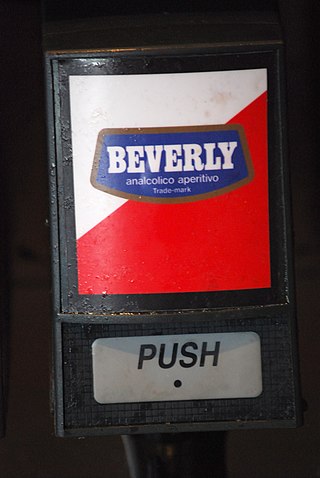
Beverly is a carbonated soft drink marketed as a non-alcoholic apéritif, that was produced by The Coca-Cola Company for the Italian market, introduced in 1969. An apéritif is a drink consumed before a meal that is believed to help digestion. Following ongoing product consolidation in the Italian market, Beverly was discontinued in 2009.
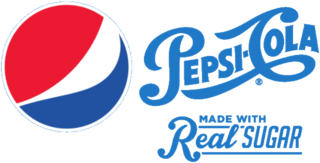
Pepsi-Cola Made with Real Sugar, originally called Pepsi Throwback—and still branded that way in some markets—is a soft drink sold by PepsiCo. The drink is flavored with cane sugar and beet sugar instead of high fructose corn syrup, with which soft drink companies replaced sugar in their North American products in the 1980s. In June 2014, the Pepsi Throwback name was replaced by the current name, which continues to be made without high fructose corn syrup. As of April 2020 it received a new logo. The "throwback" name was also used for a variant of PepsiCo's citrus-flavored Mountain Dew.
Tracey Moberly is an interdisciplinary artist, author and radio show host, and was also a co-owner of the Foundry in London. She exhibits prolifically and is best known for her work with mobile phone text messages around which her book Text Me Up! is based. Moberly's art is often described as socio-political.

















